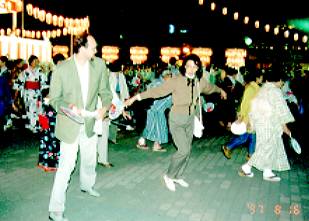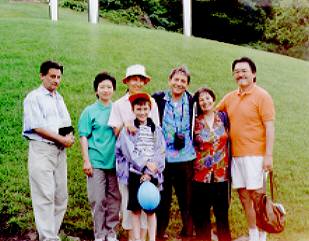| Annual Newsletter of the Slavic Research Center,
Hokkaido University |
||
| No.5
, December 1997 |
back to INDEX>> | |
| Mordechai
Altshuler |
Boris N. Mironov |
Volodymr A. Potulnytskyj |
Vilmos
Agoston |
Oleg T.
Bogomolov |
Alfred F. Majewicz |
 by Volodymr A. Potulnytskyj
(Institute of Ukrainian Archaeography,
National Academy of Sciences of Ukraine, Kiev, Foreign Visiting Fellow,
SRC, 1997-98)
by Volodymr A. Potulnytskyj
(Institute of Ukrainian Archaeography,
National Academy of Sciences of Ukraine, Kiev, Foreign Visiting Fellow,
SRC, 1997-98)
 The whole picture - traditional
Japanese lamps, the relative silence of a considerable number of
children, solitary cries of men following the rhythm of the drums, the
expression of vigorous determination was seen in many faces.
Repetition, monotony and, seemingly, infinity - all of this created a
feeling of something distant and eternal. It recreates not only the
world of the samurai and the shogun, but something more distant and
deep. I, along with my wife, decided to join this fascinating action,
and our son
Georgii took part in the festival for three nights. On one of them he
was
surrounded by Japanese and danced very close to the musicians and was
very
happy.
The whole picture - traditional
Japanese lamps, the relative silence of a considerable number of
children, solitary cries of men following the rhythm of the drums, the
expression of vigorous determination was seen in many faces.
Repetition, monotony and, seemingly, infinity - all of this created a
feeling of something distant and eternal. It recreates not only the
world of the samurai and the shogun, but something more distant and
deep. I, along with my wife, decided to join this fascinating action,
and our son
Georgii took part in the festival for three nights. On one of them he
was
surrounded by Japanese and danced very close to the musicians and was
very
happy. In general, here we are
surrounded with great attention on the part of Japanese people - in the
small everyday life questions and in more serious problems as well.
Although, I think, my family is not the only one in
such a position. There are many pleasant visitors here ム scholars from
different countries around the world. We are acquainted with the family
of Professor Majewicz from Poland. He speaks many languages, including
Japanese and Chinese, has traveled many places around the world, and is
a very interesting person in general. We became very close with the
Hungarian
journalist and writer Dr. Agoston, and with Professor Altshuler and his
wife from Israel. Professor Altshuler speaks Russian, and his wife
speaks
Polish, so we use both languages while communicating. We frequently
visit
festivals, stroll in the parks, go to the museums together, and take
pictures
of each other. These citizens of Japan are volunteers, members of an
organization
for international communication. They lavished great attention on us
during
traditional Japanese festivals. Our son and Professor Altshuler became
very close.
In general, here we are
surrounded with great attention on the part of Japanese people - in the
small everyday life questions and in more serious problems as well.
Although, I think, my family is not the only one in
such a position. There are many pleasant visitors here ム scholars from
different countries around the world. We are acquainted with the family
of Professor Majewicz from Poland. He speaks many languages, including
Japanese and Chinese, has traveled many places around the world, and is
a very interesting person in general. We became very close with the
Hungarian
journalist and writer Dr. Agoston, and with Professor Altshuler and his
wife from Israel. Professor Altshuler speaks Russian, and his wife
speaks
Polish, so we use both languages while communicating. We frequently
visit
festivals, stroll in the parks, go to the museums together, and take
pictures
of each other. These citizens of Japan are volunteers, members of an
organization
for international communication. They lavished great attention on us
during
traditional Japanese festivals. Our son and Professor Altshuler became
very close.(translated from Russian by Edward Vlassov)